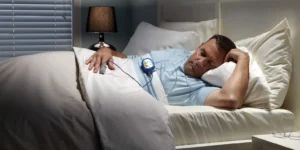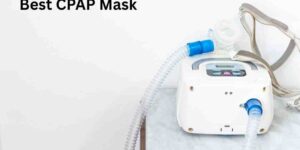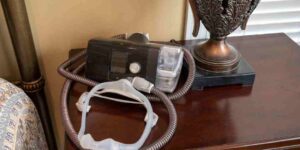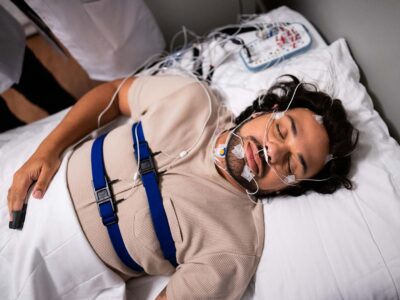
Is Sleep Apnea Affecting Your Health? Warning Signs You Shouldn’t Ignore
Oct 27 2025 Sleep Hygiene CPAP therapy healthy sleep sleep apnea sleep apnea symptoms sleep apnea treatments sleep disorders sleep health sleep medicine sleep studyGetting enough rest isn’t just about how many hours you sleep — it’s about the quality of your sleep. But what if something invisible is disrupting your rest every night, leaving you exhausted and putting your health at risk? That “something” might be sleep apnea — a common yet often overlooked sleep disorder that silently affects millions worldwide.
Let’s explore what sleep apnea really is, how to recognize its warning signs, and what treatments can help you regain the healthy, uninterrupted sleep your body deserves.
What Is Sleep Apnea?
Sleep apnea is a sleep disorder in which your breathing repeatedly stops and starts during sleep. These interruptions can last for seconds or even minutes, happening dozens or hundreds of times a night — preventing deep, restorative rest.
There are three main types of sleep apnea:
- Obstructive Sleep Apnea (OSA) – The most common type, caused by the relaxation of throat muscles that block airflow.
- Central Sleep Apnea (CSA) – Occurs when the brain doesn’t send proper signals to the muscles that control breathing.
- Complex Sleep Apnea Syndrome – A combination of both OSA and CSA.
When breathing stops, the body wakes briefly to reopen the airway — often without you realizing it — leading to fragmented sleep and low oxygen levels.
The Hidden Danger Behind Sleep Apnea
Sleep apnea isn’t just about snoring or feeling tired; it’s a serious medical condition that affects your entire body. The repeated oxygen deprivation puts stress on your cardiovascular system, immune response, and mental health.
If left untreated, it can lead to:
- High blood pressure and heart disease
- Stroke and irregular heartbeat
- Type 2 diabetes
- Depression and anxiety
- Chronic fatigue and poor focus
According to the American Academy of Sleep Medicine, millions of adults remain undiagnosed — often mistaking their symptoms for simple tiredness.
Recognizing the Warning Signs of Sleep Apnea
Sleep apnea symptoms are easy to overlook because they occur while you’re asleep. However, your body often gives you clues during the day.
Common Sleep Apnea Symptoms Include:
- Loud, chronic snoring
- Gasping or choking during sleep
- Morning headaches and dry mouth
- Daytime fatigue or falling asleep easily during the day
- Difficulty concentrating or memory lapses
- Mood swings, irritability, or depression
- Restless sleep or frequent awakenings
A classic example: You sleep eight hours but wake up feeling drained, foggy, and unrefreshed. That’s often a telltale sign of disrupted sleep cycles caused by apnea events.
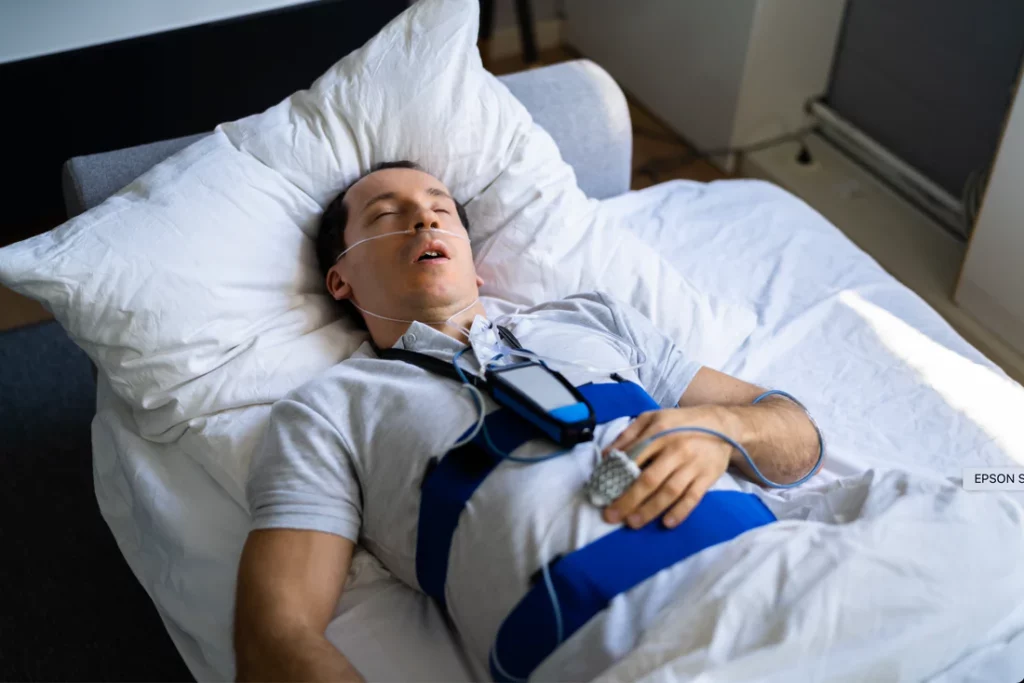
Who Is at Risk for Sleep Apnea?
While sleep apnea can affect anyone, certain risk factors make it more likely:
- Excess weight – Fat deposits around the upper airway can obstruct breathing.
- Age – More common in adults over 40.
- Gender – Men are twice as likely to develop sleep apnea.
- Family history – Genetics can play a role.
- Smoking and alcohol use – Both relax airway muscles and worsen symptoms.
- Nasal congestion or sinus issues – Can restrict airflow and trigger apnea events.
Even fit individuals can experience sleep apnea due to jaw shape or nasal structure, so it’s important not to dismiss symptoms based on physical appearance alone.
The Importance of a Sleep Study
If you suspect you may have sleep apnea, your doctor will likely recommend a sleep study (also known as polysomnography).
This test monitors:
- Brain waves and muscle activity
- Breathing patterns
- Heart rate
- Oxygen levels
Many people now opt for home-based sleep studies, which are convenient and effective for diagnosing obstructive sleep apnea. The results help your sleep medicine specialist determine the severity of your condition and the best treatment plan.
Treatment Options for Sleep Apnea
Once diagnosed, you’ll be relieved to know that sleep apnea treatments are highly effective and customizable.
1. CPAP Therapy
The gold standard for moderate to severe cases, CPAP therapy (Continuous Positive Airway Pressure) uses a mask connected to a machine that delivers steady air pressure to keep your airway open while you sleep.
Many patients report feeling more energetic and alert after just a few nights of consistent use.
2. Oral Appliances
Custom-made by dentists, these devices reposition your jaw or tongue to keep your airway open. Ideal for mild to moderate cases or those who can’t tolerate CPAP.
3. Lifestyle Changes
Some cases improve with simple adjustments:
- Lose weight if overweight
- Avoid alcohol, smoking, and sedatives
- Sleep on your side instead of your back
- Maintain a consistent sleep routine
- Stay physically active
4. Surgical Treatments
For individuals with structural issues (like a deviated septum or enlarged tonsils), surgery may be an option to improve airflow.
Real-Life Impact: Regaining Restful Sleep
Take the case of David, a 45-year-old who had been struggling with exhaustion and mood swings. After a sleep study confirmed obstructive sleep apnea, he began CPAP therapy. Within weeks, he noticed dramatic improvements — fewer headaches, better concentration, and stable energy levels throughout the day.
This real-world example shows how addressing sleep apnea can transform quality of life — not just at night, but every waking hour.
Why Early Detection Matters
Ignoring sleep apnea symptoms doesn’t make them go away — it often makes them worse. The longer the disorder goes untreated, the greater your risk for serious complications like heart disease or stroke.
If you snore loudly, wake up gasping for air, or constantly feel tired despite sleeping all night, it’s time to schedule a sleep study. The earlier it’s diagnosed, the easier it is to treat — and the better your long-term health outlook will be.
Final Thoughts: Take Control of Your Sleep Health
Your sleep is your body’s repair system — and sleep apnea can quietly sabotage it. By recognizing the warning signs and seeking help, you can reclaim the deep, restorative rest your body needs to thrive.
Don’t let this hidden disorder go unnoticed. Talk to your doctor, explore CPAP therapy or lifestyle changes, and start prioritizing your sleep health today. Remember, a good night’s rest isn’t a luxury — it’s a foundation for lifelong well-being.
FAQS
Sleep apnea is a sleep disorder where breathing repeatedly stops during rest. This disrupts oxygen flow and prevents deep sleep, leading to fatigue, heart strain, and other health issues. If untreated, it can increase the risk of heart disease, stroke, and diabetes.
Common signs include loud snoring, gasping for air during sleep, excessive daytime fatigue, and morning headaches. You might also experience poor concentration and mood changes. If these symptoms persist, a sleep study can help confirm the diagnosis.
Yes, mild cases of sleep apnea can often be managed with lifestyle changes such as weight loss, changing sleep positions, and avoiding alcohol or sedatives. However, moderate to severe cases may still require CPAP therapy or oral appliances prescribed by a sleep specialist.
People who are overweight, smoke, or have a family history of sleep disorders are at higher risk. Men over 40 are more prone, but sleep apnea can affect anyone — including women and even children.

